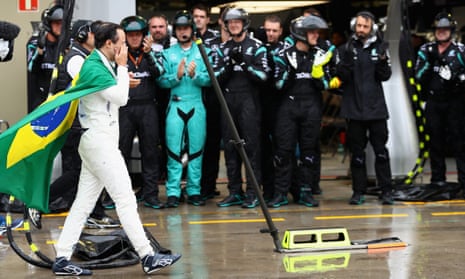As they peered anxiously through the spray and narrowly avoided rivals bouncing off the barriers at 170mph, the current crop of Formula One drivers proved their worth in São Paulo last Sunday. Heavy rain turned the Brazilian Grand Prix into a proper race, full of the kind of excitement and unpredictability that have been virtually banished from modern Formula One.
If only F1 were like that all the time. Or even half the time. Instead the circus pitches up in Abu Dhabi next week with the world drivers’ championship still in the balance but very little prospect of the sort of spectacle we saw in the penultimate round of a largely uneventful series.
Changes are coming to Formula One, and some hallowed monuments are falling. The 69-year-old Ron Dennis’s enforced departure from the leadership of the McLaren team, whom he rescued 45 years ago, may be followed by that of the sport’s ringmaster, the 86-year-old Bernie Ecclestone, once the sport’s new US-based commercial rights holder, Liberty Media, sorts its plans out. Jenson Button and Felipe Massa, with 550 grand prix starts between them, take their final bows next weekend, while Max Verstappen leads a new bunch of teenage tearaways ready to take their place. Mercedes, Ferrari and Honda are looking with interest at the commitment of Renault, Jaguar, BMW, Audi and others to Formula E, which seems more in tune with a future of all‑electric road transportation. But what doesn’t change is what happens when rain falls on race day.
Last Sunday it made all the difference, as it did when Ayrton Senna produced his masterpiece at Donington Park in 1993 and Lewis Hamilton opened a few eyes at Silverstone in 2008. Even at Monaco, where overtaking is all but impossible in dry conditions, a spring shower transforms the event into something likely to live in the memory, such as Olivier Panis’s victory in 1996, when his Ligier was one of only four cars still moving at the finish.
According to the forecast, it will not rain in Abu Dhabi next weekend. Rain is not actually unknown there – there were light showers during the free practice sessions of 2010 and 2015 – but this year the sun will shine from a cloudless sky. So if Hamilton wins his 12th pole position of the year, and Nico Rosberg makes it yet another all-Mercedes front row, you can pretty well bet the house on the general outcome.
In its normal bone-dry state, the Yas Marina circuit is not designed to produce interesting racing. Fernando Alonso can still feel the frustration of being denied a third title when the nature of the track prevented him from overtaking Vitaly Petrov in the 2010 season finale. What it does produce, in very large quantities, is money for the owners of Formula One, on whose behalf Ecclestone negotiated a huge fee in exchange for allowing Abu Dhabi to host the final round.
So there will be great television shots from exotic camera positions capturing the sun setting over the circuit during the race, showing the lights illuminating the track, and sweeping across the blue shroud covering the five-star Yas Island Viceroy hotel, which overlooks the action. It will all look just like the brochure: a vision of some new corporate leisure paradise where all the inconveniences are neatly tucked out of sight. The drivers will go round and round and the only displays of overt emotion will come once they are out of their cockpits.
It was different in São Paulo, where the rain seeped inside their visors and they could not be sure when their tyres would skate across a lake of standing water, leaving them helpless. Sure, it was dangerous. That’s how it should be. To the fury of the crowd, the race director did his best to minimise the danger by starting the race with the cars droning round for lap after lap behind the safety car. He didn’t want to see half the field out of the race at the first corner. But risk is something that the drivers have to accept when they apply for the job.
At times on Sunday we saw very clearly what separates them from us. Hamilton had the advantage of a clear track and no spray, but he drove with a wonderful finesse to avoid the aquaplaning that made victims of so many others. And Verstappen’s charge from 14th to third in the last 16 laps, overtaking one car after another by venturing on to areas of the track that others were too cautious to use, was a performance to settle any doubts about the 19-year-old’s talent at the wheel.
Others did not fare so well. Rosberg, finishing a safe second but never looking in the same class as his Mercedes team-mate up ahead, moaned into his radio: “Haven’t they seen enough crashes?”
But then a premature halt to the race would have suited his purposes, since he needed only to finish in a high position to maintain his advantage over Hamilton in the title race. Sebastian Vettel’s whingeing over the airwaves was tiresome, his loudly expressed desire to have the race stopped hardly befitting a four-times champion.
An exception to criticism would have to be made for Massa, who showed his vulnerability in wet conditions – he is remembered, among other things, for spinning his Ferrari no fewer than five times during the race at Silverstone in 2008, which he finished in 13th and last place. Last weekend his penultimate grand prix ended with a high-speed crash on the 46th lap, but his disappointment was quickly assuaged by the reception he received from his home-town crowd on his last visit to Interlagos as an F1 driver.
It was there, in 2008, that he spent 39 euphoric seconds believing that he had become world champion, only to learn that Hamilton had snatched the title on the last lap by slipping past Timo Glock into fifth place, earning the points that gave him his first title. Massa was never a truly great driver, not a Senna nor a Schumacher, but he was an honest, fair, wholehearted and thoroughly likeable competitor, a proper racer whose recovery from a horrible eye injury in 2009 won widespread sympathy.
As he walked along the pit lane on Sunday, listening to the cheers of the crowd and giving way to tears when other teams came out to join the applause and his wife and small son arrived to embrace him, there was a glimpse of a better Formula One, one unafraid to show some humanity.

